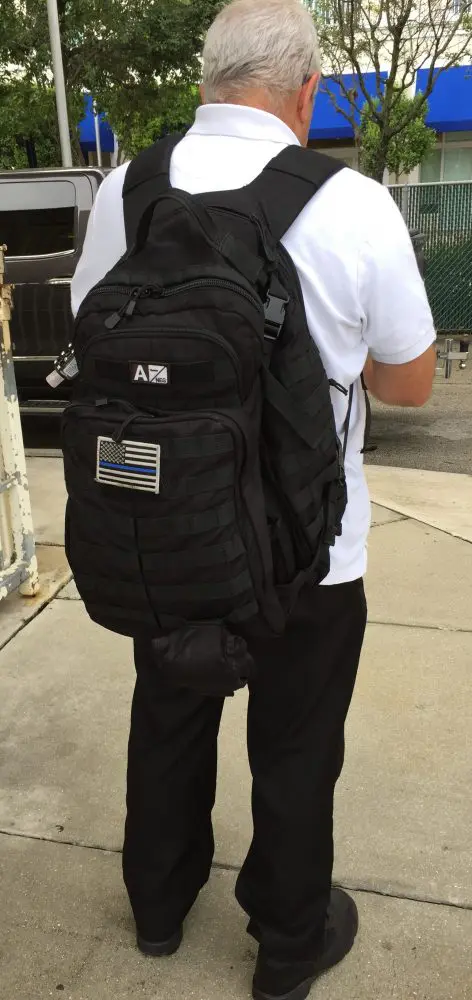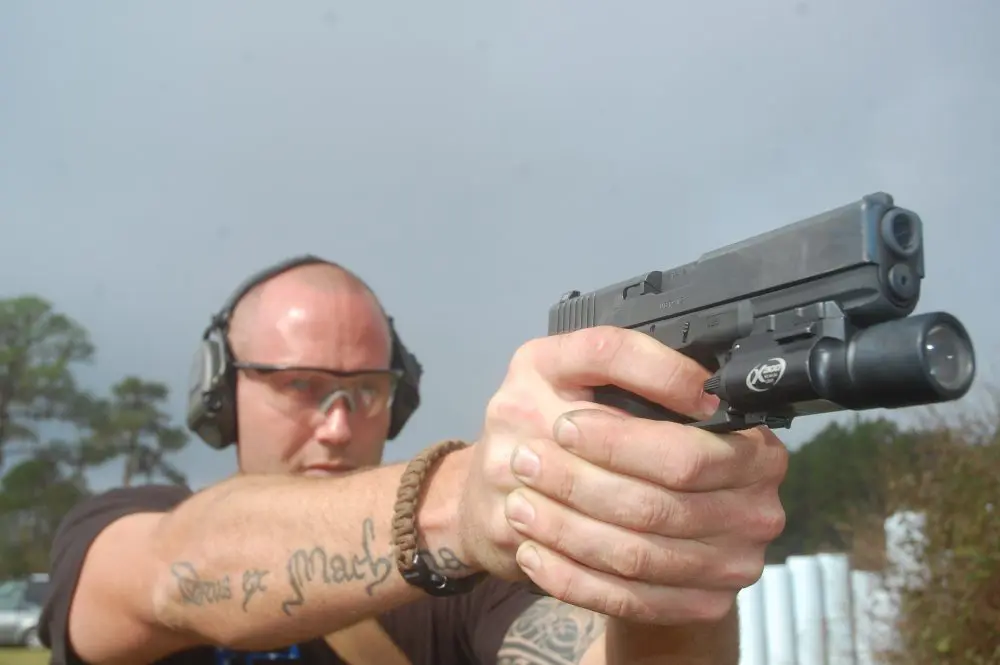I’ve not yet been shot. Shot at? Yes. Hit? No. It’s not much of a party.
On the first night of the L.A. riots in 1992, 11 other officers and I were engaged in a major gunfight with many suspects in the projects at 114th and Central. We were rescuing fire department personnel who had been shot and were still coming under fire. Rounds were going everywhere, our Metro rides were impacted, and the sidewalk and building we initially deployed in front of were chewed up pretty well as we contained the area. (We basically gave up counting the impacts when it reached 173 bullet strikes, almost all of which were from AKs stolen earlier in the day.)
The fight went on for one hour and 45 minutes. Suspects were downed, and under the circumstances, the officer involved shooting investigations were the briefest I’ve ever experienced. I may be mistaken on this, but I think it was Winston Churchill who once said, “There is nothing more exhilarating than to be shot at without result.” I’d pretty much go along with that with the notable exception that that’s the type of exhilaration I can do without.
The question among those of us fortunate enough not to have sustained gunshot wounds is, “What should I expect when I get hit?” I’ve talked with many military, police officers and private citizens over the decades who have been struck by gunfire. In Metro we provide security to witnesses, suspects and victims when needed, both at the hospitals and residences when called for. We provide it to all LAPD officers who have been shot.
During these details, the discussion with the protected person eventually leads to what they personally experienced when struck. Most seem to describe the event as being struck with a baseball bat and then having a red hot poker run through them. Some will experience a dull thudding pain, others a sharp stabbing pain and some will experience a nominal sensation that belies the severity of the wound they have sustained. In other words, they seem to run the gamut. I don’t have an actual count of those I’ve talked to who have been shot, but it’s a lot. One truth seems to emerge out of all this—there is no truth to speak of.
It’s hard to say what you might expect to experience if you’re unfortunate enough to be shot. Were you expecting it or did it come out of the blue? Were nerves disrupted or organs damaged? Is it a peripheral or centered shot, etc.? There are many variables here.
Numerous surgeons, anesthesiologists, trauma care physicians and paramedics attend our classes. A lot of insight is gained from these professionals.
For instance, if an individual is in a heightened state of excitement such as a pursuit or is responding to an “officer needs help” call or is involved in an altercation or perhaps a shooting, the body immediately adapts by releasing adrenaline and steroids. This release in turn steels the body for heightened sensory awareness in some areas and dulled sensations in others. Time perception, auditory senses and pain receptors may be radically altered from those experienced in a normal relaxed state. In such a case, an officer may very well be unaware of the severity of a sustained gunshot wound. Others may be acutely aware of damage sustained and experience a sensation of great pain, yet they will be able to continue to function despite the wound(s).
In one of our Metro shootings, where the officer had already sustained a shattering gunshot wound to the arm, he was completely unaware that he had sustained a second gunshot wound. The follow-up shot by the suspect was a centered .357 bullet strike to his spine that was stopped by his vest. Not until the operating room personnel cut away his vest was he aware of this fact.
In yet another shooting, the officer was slowly searching a suspect’s residence when he was suddenly, as he stated, “knocked to the ground with the wind taken out of me from out of nowhere.” He had been struck by a .22 Long Rifle round fired into his shoulder from an elevated position relative to his location. The round had directly impacted nerves in his shoulder area that in turn led to this sensation. He stated that he was temporarily incapacitated, in tremendous pain and gasping for air and was later amazed to discover that it was all due to the diminutive .22 Long Rifle.
These are just two incidents of the many I’ve come across, but they are classic illustrations of the range in cause and effect when discussing wound effects.
In yet another 2005 incident involving a very famous surveillance unit within LAPD, a suspect was struck in the abdomen with 12 pellets of 12 gauge, 00 buckshot. The pellets resulted in a thru and thru injury after which the detective involved ordered the suspect to get on the ground. The suspect then, with a very calm demeanor, demanded to know just why the detective had shot him. There was no sense of urgency or pain or acknowledgement of the fact that he was leaking transmission fluid—nope, he just wanted to know why he had been shot. (Reasonable request, I suppose.) Had that been you or me, I’m relatively sure we would have dispensed with such queries until a more propitious time.
If you’re struck in either the brain or the spinal cord, the response is most probably one of an academic nature. Unlike Hollywood’s portrayal of headshots (read: brain), suspects whostagger about prior to their screen demise, a person would simply drop straight down—end of question. Violent disruption of the spinal cord would result in pretty much the same thing.
Nobody can give you a definitive answer as to what your response might be should you be struck in areas other than the brain or spinal cord. Joints struck by gunfire most probably won’t work, and bones can actually shatter and displace themselves, resulting in no solid structure for muscle, etc.
In the 1970s film The Yakuza with Robert Mitchum, a Japanese actor, Tanaka Ken, portrays a Master Kendo instructor. He is asked what to expect when fighting. “Expect nothing,” is his only reply. All things considered, that was a good response.
[Scott Reitz is a 30-year veteran of the Los Angeles Police Department and the director of the highly acclaimed International Tactical Training Seminars. Course information and schedules are available at their website at www.internationaltactical.com or by email at [email protected].]



